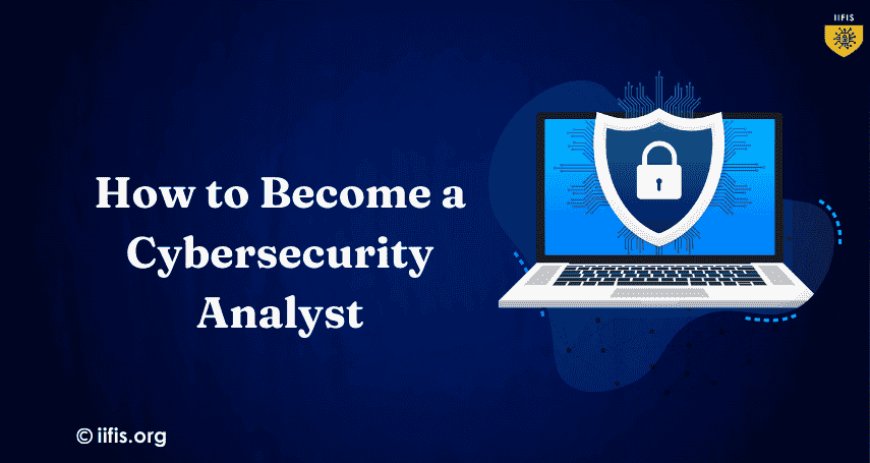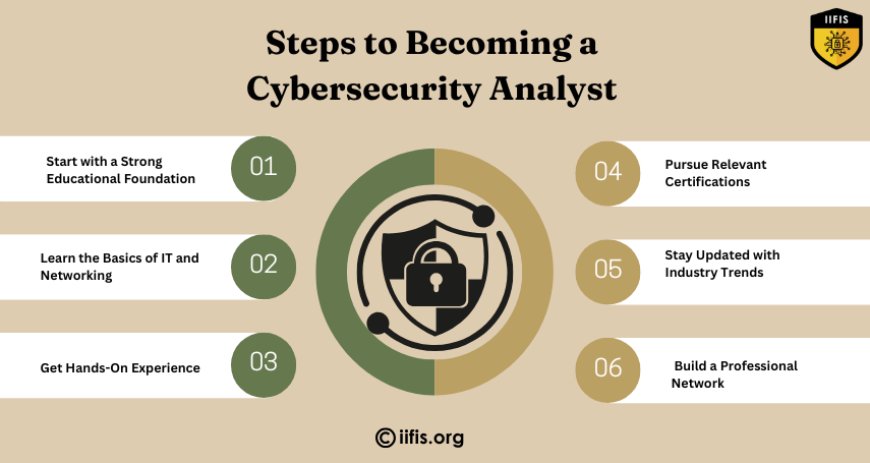How to Become a Cybersecurity Analyst: Essential Skills & Steps
Learn how to become a cybersecurity analyst with essential skills, certifications, and steps to protect digital systems and build a successful career in cybersecurity.

As a cybersecurity expert, I can tell you that becoming a cybersecurity professional is both a rewarding and challenging career path. In a world where cyber threats are becoming increasingly advanced, skilled cybersecurity professionals are more important than ever. As businesses, governments, and individuals rely on digital systems, the need for cybersecurity experts grows exponentially. If you're considering a career as a cybersecurity analyst, obtaining a cybersecurity certification is crucial to success. It's important to understand the key skills, certifications, and steps needed to succeed in this critical field.
What Does a Cybersecurity Analyst Do?
A cybersecurity analyst is responsible for protecting an organization’s computer systems and networks from cyber threats. This includes identifying vulnerabilities, monitoring network traffic, responding to incidents, and ensuring the implementation of strong security measures. They use a combination of technical expertise and problem-solving skills to prevent data breaches, malware attacks and other cybersecurity threats.
The role also involves constant learning, as the cybersecurity landscape is always evolving. Analysts must stay updated on the latest security trends, tools, and cyber threats to remain effective in their jobs.
Key Skills Every Cybersecurity Analyst Needs
To become an effective cybersecurity analyst, you need a combination of technical, analytical, and problem-solving skills. Below are the key skills essential for the role:
1. Network Security
-
Understanding networks, protocols, and firewalls is fundamental. Cybersecurity analysts need to ensure that networks are secure from external and internal threats by implementing proper firewalls, encryption methods, and VPNs.
2. Incident Response and Management
-
Analysts must be quick to detect, investigate, and respond to security incidents. Having a strong understanding of incident management frameworks, and knowing how to contain and mitigate threats is vital.
3. Threat Intelligence
-
Cybersecurity analysts need to monitor threats from external sources like malware, phishing, and ransomware. Understanding how to interpret threat intelligence data allows analysts to preemptively identify potential vulnerabilities and act before damage occurs.
4. Encryption and Cryptography
-
Knowledge of encryption techniques is crucial to protecting sensitive information. A cybersecurity analyst should understand how to secure data through encryption methods to prevent unauthorized access.
5. Knowledge of Operating Systems
-
Proficiency in major operating systems like Windows, Linux, and macOS is essential, as vulnerabilities can often be specific to an operating system. Understanding how to secure these systems is a crucial part of the job.
6. Security Monitoring and Tools
-
Analysts must be familiar with various security tools, including intrusion detection systems (IDS), firewalls, antivirus software, and SIEM (Security Information and Event Management) platforms. These tools help monitor network activity and detect potential threats.
7. Risk Management
-
Understanding risk assessment techniques and how to prioritize security measures based on the severity of the risks is key for a cybersecurity analyst. Balancing security and productivity requires the ability to assess and manage risks efficiently.
Steps to Becoming a Cybersecurity Analyst
Becoming a cybersecurity analyst involves a combination of education, hands-on experience, and certifications. Here are the steps you can take to enter the field:
1. Start with a Strong Educational Foundation
-
Although it’s possible to get into cybersecurity without a formal degree, having a strong educational background can give you a competitive advantage. A bachelor’s degree in computer science, information technology, or a related field is a good starting point. Some individuals may also choose to pursue a master’s degree for more specialized roles.
2. Learn the Basics of IT and Networking
-
Before diving into cybersecurity, it’s important to have a solid understanding of IT fundamentals, networking protocols, and operating systems. Knowledge of how systems and networks function will enable you to secure them properly. Consider studying TCP/IP, routing, switching, and common network devices.
3. Get Hands-On Experience
-
Practical experience is crucial in cybersecurity. You can start by setting up your own home lab to practice what you've learned. Many analysts begin with entry-level IT or networking positions to gain experience before transitioning to a cybersecurity role.
4. Pursue Relevant Certifications
-
Certifications are vital to proving your expertise to employers and staying competitive in the job market. Some widely recognized certifications include:
-
Certified Penetration Tester: An advanced certification that focuses on ethical hacking, vulnerability assessment, and penetration testing skills, ideal for those looking to specialize in offensive cybersecurity.
-
Certified Cybersecurity Manager: A certification aimed at professionals who want to transition into leadership and management roles within the cybersecurity industry, covering security policies, risk management, and strategy.
-
Cybersecurity for Leaders: Aimed at executives and senior leaders, this certification emphasizes the integration of cybersecurity into business operations, focusing on governance, risk, and compliance to align security with organizational goals.
-
AI Cybersecurity Associate: A certification that combines artificial intelligence and cybersecurity, preparing professionals to tackle emerging threats using AI-driven security solutions and tools, especially in the context of machine learning and automation.
These certifications will validate your knowledge, skills, and commitment to the field.

5. Stay Updated with Industry Trends
-
Cybersecurity is constantly evolving, and staying current is essential. Follow cybersecurity blogs, attend webinars and conferences, and participate in online forums to stay informed about the latest trends and technologies in the field.
6. Build a Professional Network
-
Joining cybersecurity groups or attending industry events is a great way to meet other professionals, share knowledge, and learn about job opportunities. LinkedIn, industry conferences, and local meetups can be valuable resources for networking.
7. Apply for Entry-Level Positions
-
Once you’ve completed your education, gained certifications, and built experience, you can start applying for entry-level cybersecurity roles. Positions such as IT support, network administrator, or security analyst will provide the foundation for your cybersecurity career.
The Importance of Certifications in Cybersecurity
As the demand for skilled cybersecurity professionals grows, certifications have become increasingly important. They not only enhance your credibility but also provide employers with tangible proof of your skills. Many organizations require specific certifications before hiring cybersecurity professionals, making it essential to earn recognized credentials.
-
Validates expertise: Certifications prove your skills and knowledge in specific cybersecurity areas, building trust with employers.
-
Enhances Career Opportunities: Certifications make you more competitive in the job market and increase your chances of landing high-paying roles.
-
Keeps You Updated: They ensure you're up to date with the latest industry trends, tools, and technologies.
-
Boosts Credibility: Being certified demonstrates a commitment to professional development and a high level of competence in cybersecurity.
-
Opens Career Growth Paths: Certifications can lead to advanced roles, such as security manager, penetration tester, or chief information security officer (CISO).
-
Helps in Risk Management: Certified professionals are better equipped to identify, assess, and mitigate security threats effectively.
-
Attracts Employers: Employers prioritize certified candidates because they are seen as better prepared to handle security challenges.
-
Increases Earning Potential: Certified professionals often earn higher salaries due to their proven expertise and in-demand skills.
-
Improves Problem-Solving Ability: Certification programs teach practical, hands-on skills that enhance your ability to solve complex cybersecurity problems.
Becoming a cybersecurity analyst requires a mix of education, hands-on experience, and certifications. By mastering essential skills and staying updated on industry trends, you can enhance your expertise and career prospects. With the growing demand for cybersecurity professionals, the right certifications will ensure you remain competitive and capable of tackling emerging security challenges.























